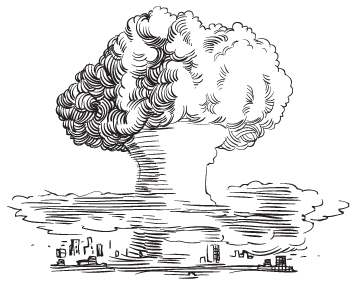

In greatness or in evil, the chief characters of the Second World War – Winston Churchill, Franklin Roosevelt, Adolf Hitler, Joseph Stalin – dwarf almost all other political leaders of modern times. The set piece moments of the war – the Battle of Britain, Pearl Harbor, Operation Barbarossa, Stalingrad, the D-Day landing and the A-bomb attacks – are among the most significant events of the 20th century. The Holocaust, the Nazi destruction of the European Jews, is arguably one of the foulest evils in history.
Without doubt, it was the most horrific conflict ever fought. But, despite the scale of the war, its hardship and suffering, and its astronomical casualties, many people who lived through it, especially those from winning nations, look back on it as the greatest days of their life. For them, the battlefront campaigns, front-line or home front comradeship, wartime romance and eventual victory are all remembered in a blur of glorious Technicolor. The rest of their lives seemed to be lived out in dull black and white. One woman, Edith Kup, who worked for the RAF, expressed it like this: “It took me years to settle down to civilian life. I had changed and no longer spoke the same language as my family. Life seemed slow, dull and pointless. We had lived on the knife edge for so long, seen dreadful sights and lost many friends. Our responsibilities had been great, but it had been exciting and we had worked as close-knit teams. I wouldn’t have missed it for the world.”
Edith Kup worked in an operations room, helping to direct fighter aircraft to intercept enemy bombers. But those who actually fought in combat had even more vivid memories. Broadcaster and writer Ludovic Kennedy recalled his part in the hunt for the Bismarck as “the most exciting five days of my life”.
But this excitement and comradeship was often bought at a terrible price. Many soldiers who had been through the war never spoke of their experiences to their friends and family back home. John Bradley was a navy corpsman (paramedic) attached to the U.S. Marines. He was one of the men who hoisted the Stars and Stripes over Iwo Jima. For the rest of his life he was haunted by the death of a close friend who had been with him on the island. Shortly after parting company from Bradley, this man had been seized by Japanese soldiers and slowly and grotesquely tortured to death over three days. It was a fate that could so easily have befallen Bradley himself.
For years after the war, Bradley would weep in his sleep, and kept a long knife at his bedside. Others took refuge in drink, to dull the grief they felt for fallen comrades, or to blot out memories of the terrible things they had done to other men. Many survivors of the war felt a heavy weight of guilt for having come home, when so many braver and better men – so they felt – had perished.
One small poem by John Maxwell Edmonds was popular with both American and British troops, who would engrave it on makeshift cemetery plaques close by their battlefields:
When you go home,
Tell them of us and say,
“For your tomorrows
These gave their today.”
Those who fought the war, and who lost family and friends, liked to think they were fighting for a better tomorrow. The Cold War that followed, and the nuclear standoff between the United States and the Soviet Union, was a bleak end to the conflict. But the idea of a world controlled instead by the inhuman regimes of Nazi Germany and Imperial Japan is a truly haunting one.